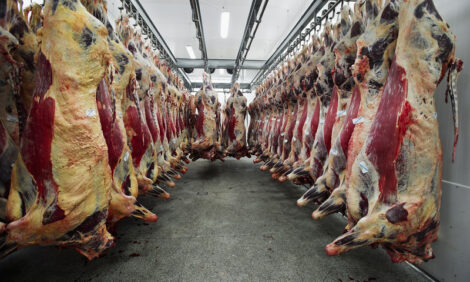



$100,000 contribution from Pfizer supports focus on training large animal veterinarians at K-State
US - High student demand and a significant commitment to educating large-animal practitioners has led to the creation of a new, six-week intensive advanced beef production medicine course at Kansas State University's College of Veterinary Medicine."The mix of veterinary students has changed significantly in the past 20 years and the percentage of students with beef production experience has declined significantly," said Ralph Richardson, dean of the K-State College of Veterinary Medicine. "At the same time, the demand for veterinarians to serve the animal health and food safety needs of the beef industry is growing. At K-State, we are committed to helping meet these needs with well-trained veterinarians who understand the challenges of producers and the beef industry."
Pfizer Animal Health shares in that commitment and partnered with K-State by providing financial support for the courses, Richardson said.
"The student interest in beef production medicine and the creation of this new advanced beef production medicine course is exciting for those of us who support the beef industry, said Steve Clarken, Pfizer beef group director. "Pfizer is proud to help fund the expansion of the beef production medicine initiative at K-State because we understand the success of beef producers is impacted by the expertise of the veterinarians who serve them. This course will help educate future leaders who will help ensure the health and productivity of beef animals, and ultimately the beef industry."
The development of the new advanced beef production medicine course is an outgrowth of two courses the college launched in 2005: advanced cow-calf production medicine and advanced feedlot production medicine.
Offered in the spring and fall, respectively, these three-week courses are limited to 15 to 20 students per year. The new course will be offered during May and June and will be open to 30 students from K-State and other cooperating veterinary colleges.
The cow/calf segment of the course is designed to help students gain an understanding of current management practices in the areas of health, nutrition, growth, economics, marketing, genetics, pharmaceutical management and reproduction. Classroom lectures will be combined with field trips to visit practicing veterinarians and working operations.
The feedlot segment allows students to learn the practical aspects of feedlot production and management. The course will focus on aspects of animal husbandry, management and medicine as they relate to performance, health and well-being of food-producing animals. In addition, students will explore programs for disease prevention and supportive care that will facilitate production of a quality food product and the profitability of cattle-feeding operations.
Source: Drovers


